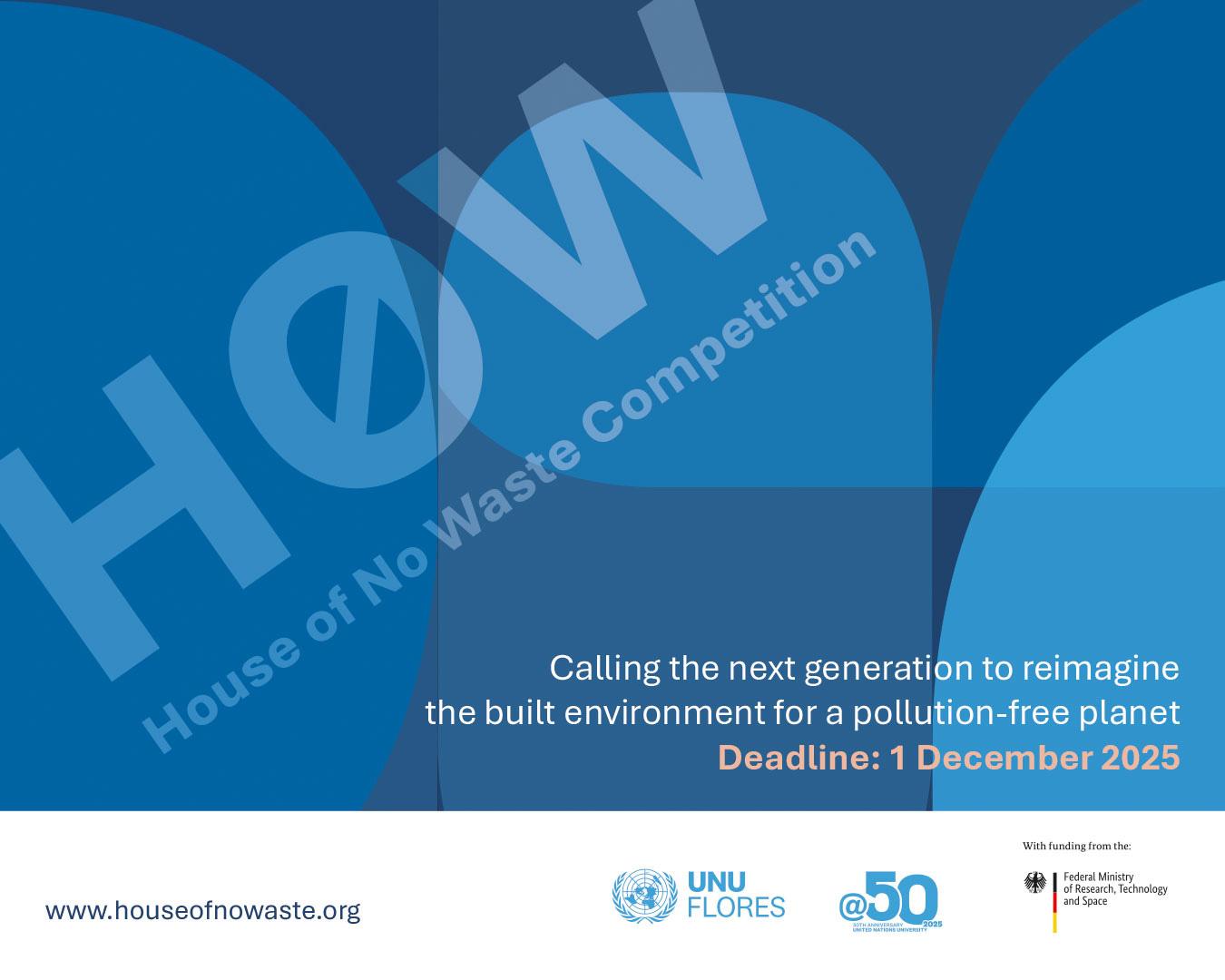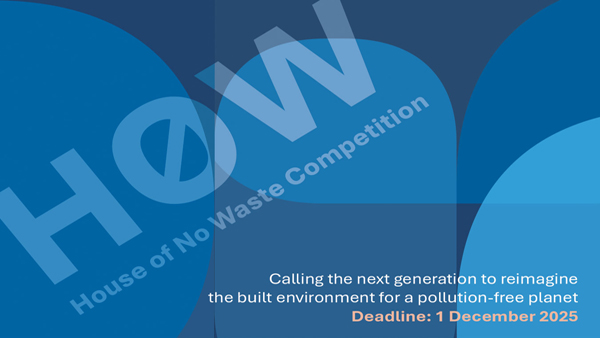
Initiated by the United Nations University Institute for Integrated Management of Material Fluxes and of Resources (UNU-FLORES), the House of No Waste competition (HØW) calls upon aspiring young architects, engineers, planners, scientists, and designers to engage in a global competition. The vision for the HØW Competition is to develop proposals for groundbreaking public projects that not only embody circular economy principles and human-centred design, but to also set a new standard for how we manage resources and avoid wasting resources in construction. Submissions can take the form of a building concept, an urban planning strategy, a building or material system, a construction technology or process, or a product relating to the built environment. Participants have the freedom to define a site, context, or target user group for their submission.
The deadline for entries to the competition is Monday, 1 December 2025, 02:00 p.m. CET. Project authors must be young professionals or students with a maximum age of 40 years at the opening of the competition (date of birth must be later than 31 August 1984). Participation of professionals in mixed, transdisciplinary teams is encouraged. Prize-winning projects of the HØW competition will receive UNU recognition and public promotion, as well as monetary prizes. The total net amount of at least 30,000 euros is allocated for prizes and acknowledgements, split between three main prizes and three acknowledgements. Participation in the competition is free of charge.
Participants can apply their work now and subscribe to the HØW-Newsletter for competition updates online at: houseofnowaste.org
The jury
The jury is an independent consultant to UNU-FLORES and is composed of the persons listed below, each representing a continent around the world:
- Tatiana Bilbao, Architect, Mexico City, Mexico
- Barbara Buser, Architect, Basel, Switzerland
- Momoyo Kaijima, Architect, Tokyo, Japan
- Mark Lee, Architect, New York, USA
- Zegeye Cherenet Mamo, Architect, Addis Abeba, Ethiopia
- Jane Wernick, Engineer, London, Great Britain
Advisory board
The advisory board provides advice in the preparation of the competition documents, the preliminary examination of submissions, and during the jury deliberations, without a vote, and consists of:
- Prof. Marc Angélil, Architect, ETH Zurich, Los Angeles/Zürich
- Prof. Manfred Curbach, Engineer, TU Dresden, Dresden
- Prof. Edeltraud Guenther, Director of UNU-FLORES, Dresden
- Prof. Dirk Hebel, Architect, KIT Karlsruhe, Karlsruhe
- Dr. Yazid Ninsalam, Landscape Architect, RMIT University, Melbourne
All relevant dates of the competition procedure:
• Competition launch Thursday, 28 August 2025
• Online Webinar 1 Monday, 8 September 2025, 10:00 a.m. CEST
• Online Webinar 2 Monday, 22 September 2025, 10:00 a.m. CEST
• Competition deadline Monday, 1 December 2025, 02:00 p.m. CET
• Jury meeting January 2026
• Online Exhibition (envisaged date) 2026
For more information and to register for participation: houseofnowaste.org
Contacts:
Atiqah Fairuz Salleh, Advisor Strategic Initiatives (b.m.salleh@unu.edu)
Benjamin Hossbach, Competition Advisor (benjamin.hossbach@unu.edu)
Benedikt Crone, Project Manager (press@houseofnowaste.org)
ABOUT UNU-FLORES
UNU-FLORES, established in Dresden, Germany, in 2012, is one of thirteen institutes and programmes, located in 12 different countries, which together comprise the United Nations University. UNU-FLORES operates at the intersection of science, policy, and education to address complex sustainability challenges through a holistic understanding of resource interconnections. In 2025, as the United Nations University celebrates its 50th anniversary, UNU-FLORES is marking the occasion with the launch of the HØW competition. The project is guided by the principles of the European Union’s 9Rs for a circular economy: Refuse, Rethink, Reduce, Reuse, Repair, Refurbish, Remanufacture, Repurpose, and Recycle, in line with the United Nations’ ambition for a pollution-free planet.



